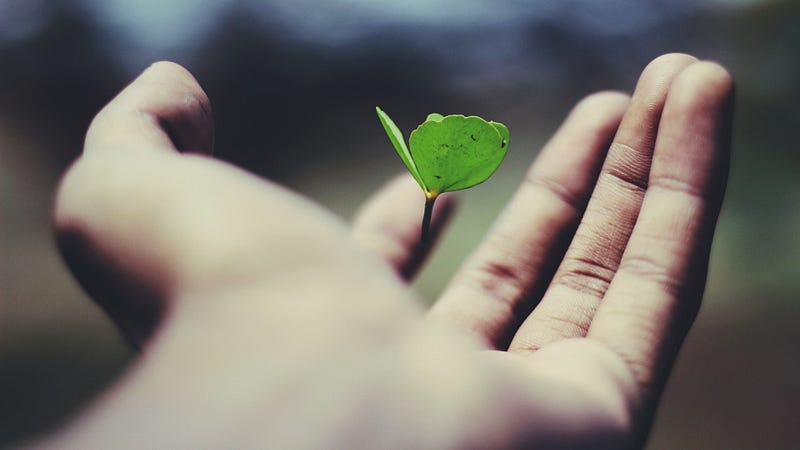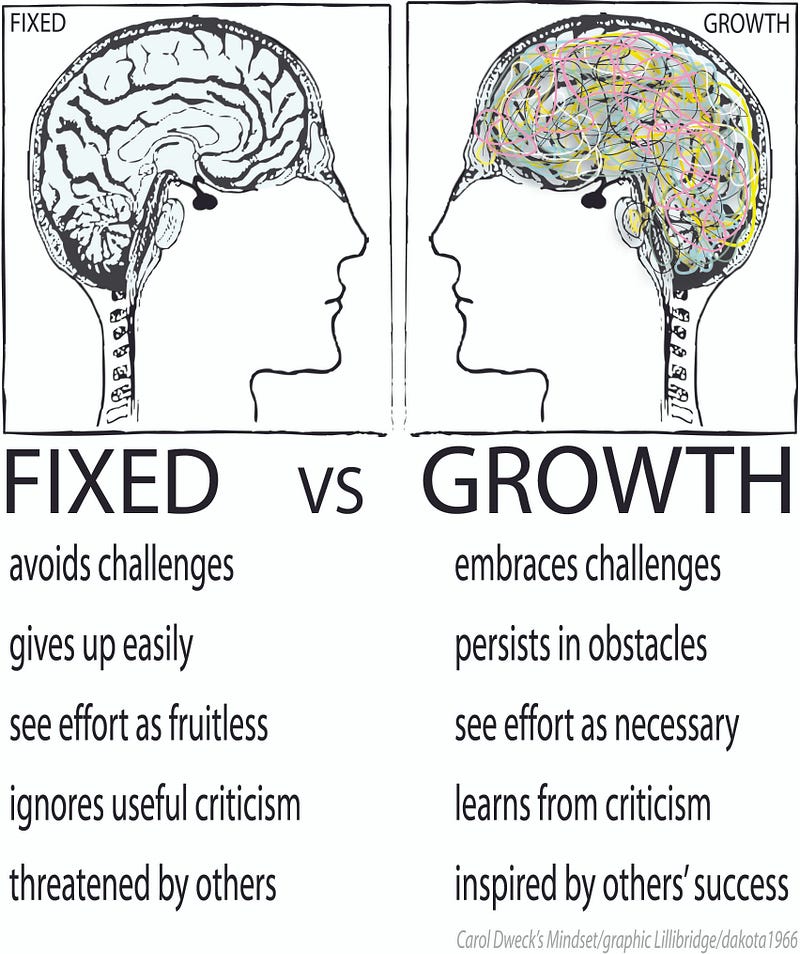How a Mindset Can Impact Your Life and Help You Learn More
How a Mindset Can Impact Your Life and Help You Learn More
Adopting the right mindset might just change the way you experience life, and make it easier and more enjoyable to learn new things.

“Mind over matter.”
“It’s all in the mind.”
“Where focus goes, energy flows.”
Are these just catchy phrases? Easy to latch onto, repeat out loud, and tweet, without much more substance to them than that?
Or do their underlying messages have some truth?
Do the mindsets we adopt determine our ability to make progress, get us through difficult situations, and achieve our goals?
Can the way we think about learning impact how much we’re able to actually learn?
The Power of the Mindset
I’m a strong believer that our mindset ultimately dictates our experience of living and life.
“Our minds aren’t passive observers, simply perceiving reality as it is. Our minds actually change reality,” - Dr. Alia Crum
Our experience of life is subjective in nature, it is personal to each of us as individuals, and is largely driven by the narrative inside each of our heads. This narrative takes on various forms. It’s the stories we tell ourselves. It’s what we believe our strengths and weaknesses are. And, among other things, it’s our sense of self-belief (or lack thereof).
The mindset we fall back on, and our state of mind in any given moment ends up becoming the lens through which we view the world.
The narratives we create and the mindsets we adopt change the way we experience the world. They can also have powerful impacts on the body and the mind.
What can the mind do?
To start, it’s been shown that adopting an optimistic outlook may significantly impact your mental and physical well-being, for the better.
Your mind and mindset can have a direct impact on your mental and physical well-being.
This is not something to brush over.
The placebo effect is a powerful example of the mind demonstrating its ability to exert its will over the body. In the medical context, this is the idea that your brain can convince your body a fake treatment is the real thing and thus stimulate healing. Under some circumstances, it can be just as effective as normal treatment… All from the patient believing that they’re being healed.
That’s not where it ends though.
This study, by Stanford University, involving both endurance and satiety when eating, showed that just thinking you’re prone to a given outcome may trump both nature and nurture.
Subjects told they had a genetic trait that gave them better endurance outperformed those who were told they didn’t. Irrespective of whether they had the gene or not. Others were told that they had a genetic trait that resulted in them producing more of a hormone that signals fullness to the brain when eating. They ended up producing 2.5 times more of this hormone than they did before. Even if they did not have the genetic trait.
In addition to being able to impact our body and perceptions, our chosen mindset and beliefs have also been shown to impact our subjective happiness and overall fulfillment value of life. It is also a key indicator of your ability to be successful and is a far better predictor of success than IQ.
These are all pretty crazy if you ask me. And those are just some examples. There are plenty more out there.
Either way, to me, the evidence is compelling. The mind is pretty powerful. Maybe we can use it? How can we tap into its power and utilize it more consciously?
“Whatever the mind can conceive, it can achieve.” - Napoleon Hill

What is Mindset?
Let’s take a step back. Perhaps it’s worth outlining what exactly a mindset is?
A Mindset is defined as the set of attitudes or beliefs we hold.
It affects everything we do, feel, think and experience.
There are several different components that contribute to each of our overall mindsets. And our overall mindset may be comprised of several sub-groups. We each fall on the scale for each of the sub-groups, leaning towards specific sides of mindset pairs, based on our past experience and current views of the world.
Some of the most well-known mindsets include:
- Growth vs Fixed
- Positive vs Negative
- Entrepreneurial vs Worker Bee
- Abundance vs Scarcity
- Challenge vs Threat
- Mindful vs Mindless
Our place on these spectrums is malleable. With deliberate practice, exercises and activities, we are able to change our mindsets and move in the direction we wish to. We just need to be willing to put in the work and be open to growing and changing. This ties perfectly with the first pair, and the one I want to discuss in this article. The Growth Mindset.
“Failure is success in progress.” — Albert Eistein
Growth vs Fixed Mindset

This pair of mindsets are believed to be two of the main ones with which we can navigate life. They are also believed to have a major impact on our ability to succeed and be successful.
A growth mindset is a tendency for people to believe that their abilities can be developed through hard work. People with this mindset try harder, want to learn new strategies, and seek out feedback when they are stuck.
With a growth mindset, people believe that intelligence, personality, and character can be changed. With consistent effort, you can be good at anything.
In contrast to this, the fixed mindset believes intelligence, personality, and character are given and fixed. They can’t be changed. It is the opposite of the growth mindset. This mindset may be a roadblock to achieving your goals because you may be less likely to believe that your goals are achievable.
“We like to think of our champions and idols as superheroes who were born different from us. We don’t like to think of them as relatively ordinary people who made themselves extraordinary.” ― Carol Dweck, Mindset: The New Psychology of Success
Carol Dweck, one of the leading researchers on these mindsets, explores them in-depth in her book Mindset: The New Psychology of Success. A must-read for anyone looking to dive in a bit deeper. The graphic below illustrates some of the main differences between the two mindsets.

If it isn’t clear enough, the growth mindset is what we should be striving towards.
With a growth mindset, our ability to learn new things is supercharged. It becomes much easier for us to persevere on our learning journeys and to understand new things.
If interested, you can also read more about the other mindset pairs here.
The Impact of Mindset on Learning
Adopting a growth mindset enables one to embrace new challenges openly. By testing our abilities and being comfortable with failure and setbacks, we are able to grow and master the things we work on. This naturally fits hand in hand with learning new things.
If you read my previous article, you’ll recall that in order to learn better, we need to test the edge of our abilities and be open to relearning things that we get wrong. This is essentially the growth mindset in practice. And believing that our intelligence is not fixed and that we can learn new things, makes it easier to do so.

The way that we think about learning is directly related to how well we’re able to learn. It is increases engagement among learners, can raise grades, and reduce the risks of dropping out. Plenty of research has been done over the years to illustrate that simply reframing the way we look at learning can be remarkable for our performance.
With the right mindset, making mistakes while learning can be seen as an opportunity to improve, rather than allowing it to be demotivating and frustrating. I believe this also naturally leads to a more pleasant experience of the process. The better a time we have, the more likely we are to do it again.
Learning to enjoy the process of learning is the best way to cultivate a lifelong learning practice.
We just need to acknowledge that intelligence is not fixed. We are able to cultivate it, nurture it, and expand it. With a little effort of-coarse.
“Test scores and measures of achievement tell you where a student is, but they don’t tell you where a student could end up.” — Carol Dweck
Stay curious, keep an open mind, and embrace challenges and the opportunity to learn something new.
How to Adopt and Build the Right Mindset?
Some of you may already have more of a growth mindset than a fixed one. Maybe you’ve been able to make it further down the road to growth than others. The steps are the same for all though.
It’s not something that changes in an instant with a few magic steps. Like most other things, it’s going to take time. But taking the first step is the most important part of the process.
“Becoming is better than being. The fixed mindet does not allow people the luxury of becoming. They have to already be.” — Carol S. Dweck
Below are a few of the things that I believed best encapsulated the way to build and develop your growth mindset, sustainably.
Be mindful of your self-talk.
Self-talk is the voice inside our head. The stories we tell ourselves. The way we describe situations to ourselves. Keep an eye on this voice.
The voice of a fixed mindset will stop you from following the path to success.
Challenge your fixed mindset. Remember that you can learn the skills you need to achieve your goals. You may not succeed the first time, but practice will help you to develop.
I find it helpful to picture the voice in my head as a coach trying to motivate his team. With positive reinforcement and kind words, he is able to inspire and the best out of them. We should speak to ourselves in the same way. Believe in your ability to learn, grow, adapt and overcome challenges.
It’s also crucial to show yourself some compassion. Don’t place too much pressure on yourself and be too hard on yourself. Allow yourself room for failure.
“The secret of life is to fall seven times and to get up eight times.” — Paulo Coelho
Acknowledge and embrace imperfection.
Recognize that we’re not all perfect, and that’s OK.
We don’t have to have everything mastered or figured out right away. It takes time to learn new things. We’re never experts starting out. Failure along the way is inevitable. That’s part of the journey.
We can reframe these imperfections and failures as opportunities for developing your skills and growing. This is a critical distinction, rather than viewing these moments as a judgment of your competence.
Everybody makes mistakes.
Be curious. Marvel at how much you don’t know. Get used to this feeling. Allow it to create excitement. There is so much we can learn!
“Admitting that you do not know something is the first step to learning” — Terry Goodkind
Recognize that you have a choice.
Everyone will face obstacles, challenges, and defeats throughout life, but the way that you choose to respond to them can make the difference between success and failure.
If you have a fixed mindset, you’ll see these setbacks as proof that you’re just not up to the job. But if you look at them as opportunities for growth, you can develop a plan for action, such as learning, working hard, changing your strategy, and trying again.
Choose your reaction. Choose how you interpret the setbacks. Reframe them for the better. As opportunities.
“Between stimulus and response there is a space. In that space is our power to choose our response. In our response lies our growth and our freedom.” — Viktor E. Frankl
Take Action and Persevere.
Life is a journey and learning is a process. Don’t focus as much on the end goal, learn to enjoy the steps that you’re taking and the process you follow each and every day. Continue to take the steps each day, remain optimistic, and celebrate the small victories.
When you practice thinking and acting in a mindset of growth, it becomes easier to tackle obstacles in a more positive way.
You have to take the first step though.

Takeaways
Our mind is extraordinary.
With the right frameworks and outlooks, it can have an incredible influence on our experience of life and the way we live. Having the right mindset is key.
Learning to take a step back, reassess our internal narrative, and reframe our experiences in a more positive and optimistic light can have profound impacts on our day-to-day life. It can have remarkable impacts on our ability to learn new things as well.
Start today, start small, and remember to show yourself some compassion.
I’ll be keeping everyone updated through the Beeline mailing list and my publications here on Medium. I’d love to talk, discuss ideas, collaborate and try and bring this kind of information to everyone! Please reach out :)
Sources: CPA Advisor, Forbes, Psychology Today, MindTools
Frequently Asked Questions (FAQs)
1 — How can adopting a growth mindset impact your learning and overall success?
Adopting a growth mindset can significantly enhance your capacity for learning and achieving success by fostering resilience, encouraging continuous skill development, and embracing challenges as opportunities for growth.
2 — What steps can individuals take to develop a growth mindset for better learning outcomes?
To develop a growth mindset, individuals can practice embracing challenges, learning from feedback, valuing effort over talent, and viewing failures as opportunities to learn and improve.
3 — How does mindset influence one’s approach to challenges and failures in the learning process?
Mindset deeply influences how one deals with setbacks and obstacles in the learning process. A growth mindset leads to persistence in the face of difficulties, viewing them as part of the learning journey, whereas a fixed mindset may result in avoidance of challenges and giving up when faced with failure.